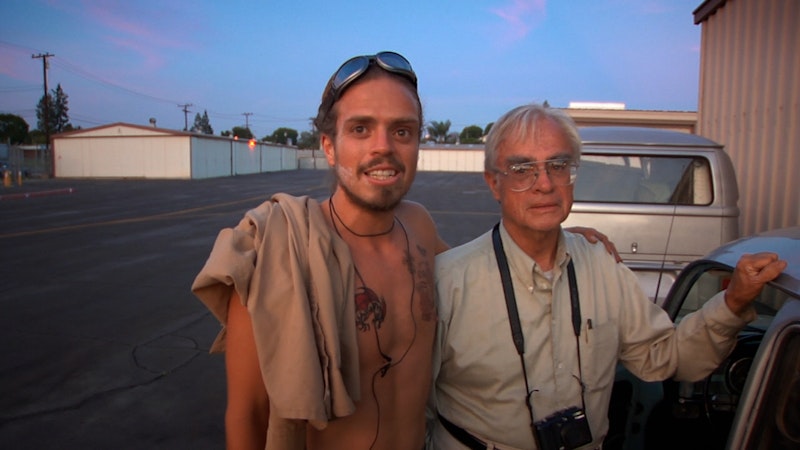A week after the New/Next Film Festival, one of the seemingly smallest films has stuck with me. While most of the crowd at the opening night screening shuffled over to Metro Gallery for a party, I made my way with about a dozen others over to Theater 2 to catch one more late-night feature. I didn’t know much about what I was about to see, just that it was some kind of documentary about the making of a film, and that the Maryland-born director had posted my interview about New/Next with Eric Hatch from Filmmaker on the film’s Instagram saying “if u don't know my Frownland love u don't know me at all”—which was undoubtedly a good sign. The Legend of MexMan was the perfect kind of movie to see at a fest like New/Next: a scrappy, personal, and hilarious (mostly) one-man film about another man’s struggles to get his own off the ground. It’s about people giving their all for art on the fringes of a massive, indifferent industry whose beating heart is money not, as is often advertised, imagination. That’s a very dramatic way of describing a film that is, through and through, an incredible comedy.
Filmed by Josh Polon over five years, The Legend of MexMan follows Germán Alonso as he tries to convert his USC student short MexMan into a feature-length debut. Germán invites the audience into his DIY studio housed in an old hanger on an anonymous southern California airstrip. Filled with hundreds, if not thousands, of models, miniatures, and stop-motion puppets all made by hand by Alonso, his unassuming space reveals a world of breathless, manic, imagination—a perfect metaphor for the aspiring filmmaker himself. Initially, the most stunning part of Legend is not just Germán’s output, but the fact that we’ve never heard of him. The clips from his shorts MexMan and Ob the Cat show a radical potential—his work is bursting with a creativity and inventiveness that’s reminiscent of early Sam Rami or Steven Spielberg projects, with all their scintillating camerawork and naive love for the medium.
The narrative gets complicated when Alonso grabs the eye of Moctesuma Esparza, who the posters in his office remind the audience that he produced Selena and Gettysburg, and offers Germán a dream shot: turn MexMan into a feature film. To prove that he has the stuff, Germán has to shoot a proof-of-concept scene. Here’s where his collaboration becomes contention, where his old USC colleagues, the Soper Brothers, start to get into a Winklevossian Social Network-like power struggle over creative control of the project. If Alonso is the imagination at the heart of Hollywood, the Sopers are the contractual bureaucrats that keep the machine oiled. Their matching rectangular glasses and starched collars contrast Germán’s flowing hair and high-octane charisma, the three of them engaging in the push-pull between artists and bureaucrats that embodies the big-money industry in its smallest, lowest-stakes context. From the outsider’s perspective, the scale of the project against the huge emotions involved makes for tense, awkward comedy that was ahead of its time when filmed in the early-2010s and right on the pulse in 2023; it’s full of the small business awkwardness of Nathan for You and the oddball yet sensitive observation of How To with John Wilson.
Polon’s film was originally put out in a sort-of first draft with a small festival run in 2018, and subsequently reworked before this year’s fest cycle. Part of this, according to Polon, was rights issues with music being incorporated from Alonso’s films being cut into the doc. The biggest change, to my understanding, is the addition of a talking-head interview with Alonso, one that gives him the room to explain himself and even come to blows with Polon’s narration of his own story. It’s another one of the painful-to-watch parts of the movie, where Germán’s need to express himself also comes with a defensiveness out of insecurity. It can be bitter, but honest—the kind of uncomfortable openness that can really only come from a filmmaker who cares about the subject. In this case, it’s not just another artist-subject relationship, but a film made by someone who wants to share a friend with the world.
As the lights came up, one of the audience members asked Polon if it was a real documentary because Germán’s story was too surprising to be believed. I agree with that sentiment, and want to extend it a little further—I can’t believe the movie hasn’t gotten more traction, but perhaps that just means it's a future cult film. Someone also asked where Germán is, if he ever got to make his feature. Polon said he’s on YouTube, that he’s “rejected Hollywood, he’s on his own terms now.”

